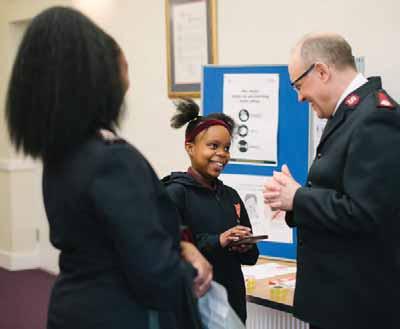
3 minute read
Feature 6 and
shall be devoted to your service’. She modelled that selfless compassion and goodwill consistently during her years on the throne.
It was fitting, then, that the Queen’s encounters with the Army often involved the opening of social centres, each one dedicated to serving others without discrimination.
In March 1968, the Queen opened Booth House hostel and Rawson Home in Whitechapel, London. In February 1980, she opened Hopetown, a home for 156 women. In December 1996, she opened Edward Alsop Court, a 112-bed
The Queen celebrates the Army centenary alongside General Frederick Coutts, the Archbishop of Canterbury, the Most Rev Michael Ramsey, and the home secretary, Frank Soskice MP
homelessness centre in Westminster.
At each occasion, as well as signing visitor books and unveiling plaques, the Queen spent time meeting and talking to the individuals present.
Edward Alsop Court’s centre manager, Major George Hardy, told the War Cry in January 1997: ‘Her Majesty was able to immediately put residents at ease and showed a great interest in them.’
Pat Gallagher, a resident of the old hostel, joked that moving into the new centre was ‘like coming out of a public house and into Buckingham Palace’, which made the Queen laugh.
In October 1997, the Queen benefited from the Army’s support herself, thanking the team at Buckingham Palace that provided a mobile canteen service, while crowds were waiting to sign books of condolence after the death of Diana, Princess of Wales.
In 2002, she returned to Booth House to reopen the refurbished facility, where she ‘chatted with informal ease’ to residents and ‘listened with undivided attention’ to how their lives had been transformed. It was apt that former resident John Tite read the parable of the good Samaritan at the event; the Queen referred to the parable several times in her Christmas speeches, most pointedly in 2020, when she paid tribute to those who had helped others during the Covid-19 pandemic.
‘This wonderful story of kindness is still as relevant today,’ she said. ‘Good Samaritans have emerged across society showing care and respect for all, regardless of gender, race or background, reminding us that each one of us is special and equal in the eyes of God.’
The Queen remained keenly aware that the Army shared that principle of faith in action. In October 1966, in the days following the tragic Aberfan mining disaster, she visited the Welsh village to express her condolences. When she was told that The Salvation Army had been on site to provide support, along with other organisations, she is said to have replied with two simple words: ‘Of course.’
Most recently, in 2020, the Queen thanked The Salvation Army personally for its work during the pandemic at a Windsor Castle carol service for charities, key workers and volunteers. Her recognition then echoed the sentiment she expressed 55 years earlier at the Royal Albert Hall.
‘This is quiet, unspectacular work,’ she said of the Army’s first 100 years. ‘But there is widespread, if unvoiced, appreciation for what is being done.’
This past week, the voices of Salvationists across the UK and beyond have reciprocated that widespread appreciation for a life of faith and service.
The Queen’s faith

BEYOND Queen Elizabeth II’s title as ‘Defender of the Faith’ and her role as head of the Church of England, the Queen was well known for her strong personal faith, which she spoke about with ease and genuine affection.
The following quotes are from various speeches and Christmas Day messages, and capture something of her faith.








